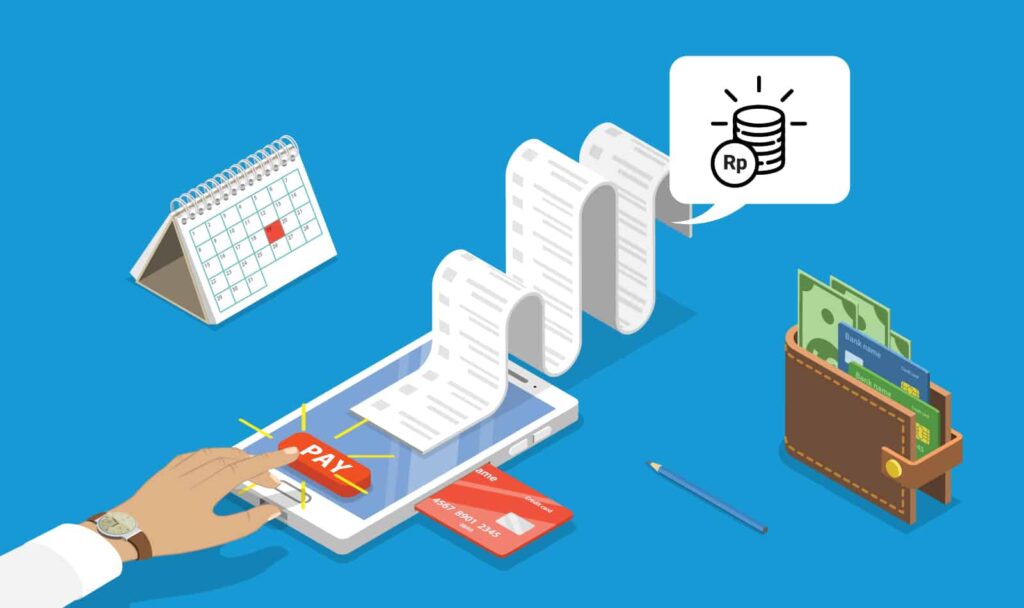Accounts receivable financing is a financial solution that enables companies to receive prompt payment for their unpaid invoices. By opting for accounts receivable financing, a company can choose to sell a portion or all of its outstanding invoices to a financing company in exchange for an upfront payment, subject to a fee.
If you are facing cash flow gaps or need to cover short-term expenses, accounts receivable financing, also known as AR financing, can provide a quick and efficient funding solution. This type of financing is particularly beneficial as it does not require additional collateral, making it a viable option for small businesses unable to meet the eligibility criteria for other types of loans.
If you’re curious about how accounts receivable financing operates and are looking for suitable choices for small businesses, here is the information you need.
What is Accounts Receivable Financing?

Accounts Receivable Financing is a financial arrangement where a company obtains capital by selling a portion of its accounts receivable. This type of financing can be structured in different ways, such as through an asset sale or a loan agreement.
Essentially, though, you can think of it as a line of credit backed by outstanding debt due to be received from customers or clients. AR financing allows for the deployment of capital that would otherwise be unusable until the debtor settles their invoice, providing more working capital to utilise in the short term.
Accounts Receivable Financing allows businesses to access the working capital currently tied up in their accounts receivable. These accounts receivable represent the money owed to the company for goods or services that have been delivered or used by customers but have not yet been paid for.
By utilizing AR financing, businesses can unlock the value of these outstanding balances and turn them into immediate cash flow. This method is especially beneficial for businesses as accounts receivable are considered as assets on the balance sheet. Accounts receivable financing is a common practice among businesses.
It occurs when companies offer credit to their customers, allowing them to make payments at a later date. This can be done through periodic invoices or by providing the option to pay after receiving the service.
The amount of credit granted by a business directly impacts the size of its accounts receivable. Ultimately, this affects the funding that can be obtained through accounts receivable financing.
How does accounts receivable financing work?

In the process of accounts receivable financing, a financial institution provides you with an advance payment for a percentage of the outstanding payments owed by your customers, typically up to 90%. Once your customer settles their invoice, you will receive the remaining amount, after deducting a fee charged by the lender.
The charges for accounts receivable financing can vary, typically falling between 1-5%, based on the specific financing firm. It is crucial to understand that the fee amount is determined by the promptness of your customer’s payment. If your customer takes longer to settle their invoice, it will result in higher costs for you.
Key points:
- Your unpaid invoices are used as collateral to secure a loan
- You still assume responsibility for collecting payment
Here’s what the process of accounts receivable financing looks like:
- Apply and secure financing
- Imagine you have a $100,000 invoice with a payment deadline of 30 days. Once you apply for it, the lender gives you the green light to receive an advance of 80% ($80,000) of the total invoice value.
- Secure financing
- Once you receive the funds from accounts receivable financing, you have the freedom to utilize them however you see fit in order to manage and grow your business. The lender will impose a predetermined fee, which can be calculated on a daily or weekly basis, depending on the terms of the agreement. For instance, if the fee is set at 3% per week, the lender will apply a charge of $3000 (equivalent to 3% of $100,000) for each week it takes for your customer to settle the invoice.
- Payment collection from your customer
- When your customer finally settles their invoice after a span of three weeks, you are then obligated to pay the lender a fee of $9,000. This fee amounts to 3% of the total invoice value per week for a duration of three weeks.
- Repayment to the lender
- Once you have received payment from your customer, you will have a remaining balance of $23,000 that you can retain for your own use. Subsequently, you will need to reimburse the lender the initial advance amount along with the associated fees, which totals $89,000.
When evaluating the overall expense of invoice financing, it is crucial to take into account the lender charges expressed as an annual percentage rate. For instance, if a 3% weekly fee is applied for three weeks on a $100,000 invoice, the estimated annual percentage rate would be approximately 62.4%.
Types of accounts receivable financing

There are various types of accounts receivable financing available to businesses, providing immediate cash flow by utilising outstanding invoices or accounts receivable. Here are some standard options:
- Factoring
- Accounts Receivable Financing is a financial strategy where companies sell their outstanding invoices to a financial institution, referred to as a factor, at a reduced price. The factor then assumes the responsibility of collecting payments from customers, while the business receives an immediate cash advance based on the discounted value of the invoices.
- Asset-Based Lending (ABL)
- ABL is a financing method where businesses use their accounts receivable as collateral to secure a line of credit. Lenders provide a certain percentage of the eligible receivables, which allows businesses to access funds whenever necessary and pay interest on the borrowed amount.
- Supply Chain Finance
- Supply chain finance, also referred to as reverse factoring, is a collaborative process that involves buyers, suppliers, and financing institutions. In this arrangement, the financial institutions of buyers offer early payment to suppliers for their approved invoices, typically at a reduced rate. Subsequently, buyers repay the financial institution for the advanced payment.
- Invoice Discounting
- invoice discounting is a financial solution that allows businesses to maintain control over their collections. This method involves using invoices as collateral to secure a loan, enabling businesses to receive a portion of the invoice value in advance. The repayment, which includes fees and interest, is made once the customer settles the invoice.
The Benefits of Accounts Receivable Financing

In the past few years, there has been a rise in the popularity of accounts receivable financing, which includes invoice factoring. This is because businesses can now receive immediate cash payments instead of waiting for long pay cycles to get paid on invoices.
Accounts receivable financing offers several advantages and provides financial freedom to many businesses. Benefits of accounts receivable financing include:
- Working Capital
- Accounts Receivable Financing offers a highly appealing advantage that is quite evident. Instead of enduring long waiting periods of 30, 60, or 90 days for invoice payments, opting for factoring can provide you with immediate cash in a significantly shorter period of time.
- Viable Alternative to Bank Loans
- Numerous businesses, particularly startups and those lacking traditional collateral, may not be eligible for loans. Additionally, some companies may not prefer the burden of monthly loan repayments. In these situations, opting for accounts receivable financing can be a favorable choice.
- Reasonable Fees
- The fees associated with accounts receivable financing are much more affordable compared to traditional options like merchant cash advance or other types of funding for startups and alternative businesses. The fees can vary depending on factors such as the industry, the percentage of advance provided, the volume of invoices, and other relevant factors.
- Growth Opportunities
- Having a sufficient cash flow gives you the ability to enhance and broaden your business whenever there is a chance. You don’t have to rely on a bank’s approval for a loan to make an immediate purchase, as you already possess the necessary funds. With our extensive experience, we can assist you in this regard as well.
- Improved Credit Score
- Accounts Receivable Financing can provide your company with multiple advantages, including improved credit score. By receiving timely funding, you can effectively manage your payables and maintain a strong financial position.
- Ease of Process
- Compared to obtaining a bank loan, the process of applying for accounts receivable financing is relatively straightforward. Once you have successfully been approved and established, the ongoing funding process is also straightforward. Moreover, your credit line can effortlessly increase in line with the growth of your business.
- Less Stress
- Having the assurance that you can settle your financial obligations and fulfill payroll without negatively impacting your credit score allows you to concentrate more on the day-to-day operations of your business, which is crucial for achieving long-term prosperity.
- Funding Available to Startups and Higher Credit Risk Companies
- Accounts Receivable Financing is an ideal option for startups, high growth businesses, or companies that have faced financial difficulties, as it allows the factoring company to assess the creditworthiness of both your debtors and your company’s financial track record.
Accounts receivable financing vs accounts receivable factoring

While AR financing and AR factoring are often mistaken for the same thing, they actually refer to distinct concepts.
Accounts Receivable Financing refers to two different methods of obtaining financing, with the main distinction being how the invoices are utilized. In Accounts Receivable factoring, the lender purchases the invoices from you at a discounted rate and assumes the responsibility of collecting payment. On the other hand, with Accounts Receivable financing, you retain ownership of the invoices and use them as collateral to secure a loan or line of credit.
Once you decide to utilize accounts receivable financing, the company responsible for AR factoring will purchase your invoices. In return, they will provide you with immediate cash, while taking on the responsibility of collecting the payment from
After your client pays their invoice, the accounts receivable financing company will provide you with the remaining funds, deducting their factoring fees. The usual rates for invoice factoring range from 1% to 6%. However, it is important to note that factoring companies may impose additional undisclosed charges.
- Closing fee
- Accounts Receivable Financing involves a specific amount of money that the factoring company retains from the invoice.
- Invoice processing fee
- Accounts Receivable Financing refers to the fee charged for the processing of unpaid invoices in the back office.
- ACH fee
- The bank affiliated with the factor charges this fee for transferring funds to your account, which is also known as a wire fee.
- Application fee
- The fee for accounts receivable financing can vary among factoring companies and may be either a fixed amount or a percentage of the total.
- Monthly fee
- If you enter into an agreement where you are obligated to sell a specific portion of your invoices every month, there is a possibility that you may be charged a monthly fee if you fail to meet the minimum requirement.
- Termination fee
- In the event that you decide to terminate a factoring agreement or long-term contract before its intended completion, it is possible that you will incur a termination fee.
Accounts receivable financing advantages and disadvantages

So what makes a business choose one type of accounts receivable financing over another? To understand this in more details, here are some advantages and disadvantages of accounts receivable financing:
Disadvantages
- Eligibility
- In most cases, accounts receivable financing is a beneficial option for individuals with a solid credit score. However, if your credit history is not as strong, you may not meet the requirements for this type of financing. On the other hand, if you have a weaker credit history, an accounts receivable factoring company is more inclined to approve your invoices.
- Invoice Quality Matters
- Accounts Receivable Financing can be less suitable for companies that do not have a regular stream of invoices and reliable customers. Meeting the requirements for this type of financing can be difficult if your business does not have a stable invoicing system.
- Cost Considerations
- Accounts Receivable Financing can come with various expenses that can quickly add up. Lenders may charge interest on the loan or line of credit, a funding fee based on the loan amount, as well as additional fees like application, maintenance, and processing fees. These costs can accumulate rapidly and have an impact on the overall affordability of the financing.
- Customer Default Risks
- If your customers fail to pay their invoices, it can have negative consequences for your ability to repay your loan or line of credit. This can result in late payment fees and financial challenges. Therefore, it is important to carefully assess the possibility of customer default when choosing to utilize accounts receivable financing.
Advantages
- Quicker cash flow
- Accounts Receivable Financing offers a quicker and more efficient alternative to obtaining the necessary funds compared to traditional loan processes. With AR financing, you can access the financing you require in a shorter amount of time.
- Cost-Effective Solution
- Accounts Receivable Financing is a highly efficient and cost-effective solution for managing working capital. This financing option is notably faster, more affordable, and less restrictive compared to traditional bank loans. By opting for AR financing, you can save valuable time and money while effectively managing your financial resources in a user-friendly and efficient manner.
- Minimal Credit Hassles
- When it comes to accounts receivable financing, you don’t have to stress about your credit score. The lenders are primarily interested in the creditworthiness and payment history of your customers, as your invoices act as collateral. As a result, you may still be eligible for this financing option, even if your credit score is not perfect.
- Ownership of invoices
- With accounts receivable financing, you can keep the ownership of your outstanding invoices. This means that while you are still responsible for collecting payment from your customers, you can continue to nurture your relationships with them. Unlike other financing options, where a third party may contact your customers for payment, accounts receivable financing helps protect your reputation by keeping this process internal.
- Guaranteed income
- Accounts Receivable Financing is a beneficial solution that not only accelerates the flow of cash but also relieves you from the inconvenience of pursuing overdue invoices. By utilizing AR financing, you have the opportunity to borrow funds that are typically trapped in unpaid invoices, reducing the necessity to aggressively pursue debtors for immediate payment. Consequently, this allows you to focus more on maximizing your working capital without the constant distraction of chasing down payments.
- Low Risk Assurance
- Accounts Receivable Financing is a reliable and secure option for businesses to borrow money based on the amount owed to them. By utilizing funds that are already guaranteed, businesses can minimize the risk of not being able to repay the loan or line of credit, making it a low-risk financial arrangement compared to relying on uncertain future sales.






Accounts receivable financing can be a valuable solution for businesses facing cash flow gaps. It’s great that it doesn’t require additional collateral, making it accessible for small businesses. However, it’s important to carefully consider the fees and promptness of customer payments to ensure it remains a cost-effective option.
I completely agree with the article. Accounts receivable financing is a great option for businesses to maintain control over their outstanding invoices and protect their reputation. It also provides guaranteed income and reduces the risk of not being able to repay loans.
Accounts receivable financing can be a helpful funding solution for small businesses facing cash flow gaps. It allows businesses to access the working capital tied up in unpaid invoices. However, it’s important to consider the fees charged by the lender and the promptness of customer payments, as this can impact the overall cost.